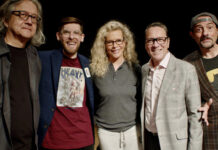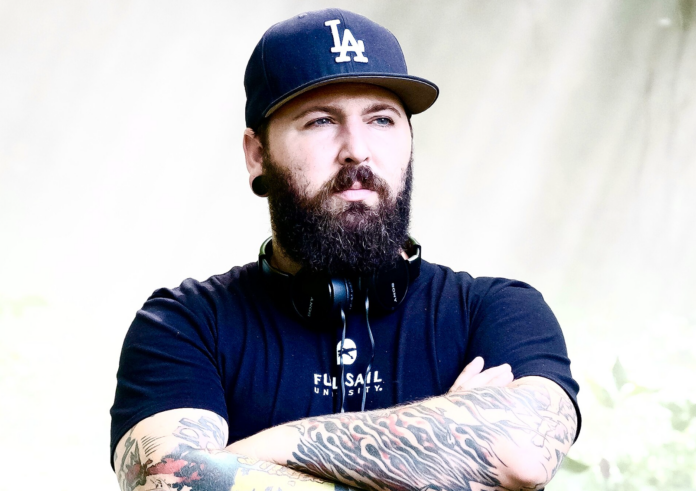AFM 2023: American Film Market explores Modern Horror: Patrick Ewald with Steven C Miller, Cecilia Brush, Bishal Dutta, Paul Neinstein
Our moderator, Patrick Ewald is an American financier and producer known for his work in the independent film and video game industries. He’s the owner and CEO of Epic Pictures Group, a film and video game production and distribution company that focuses on genre films.
His recent film credits include The Man Who Killed Hitler, Bigfoot, Satanic Hispanics, The Cellar, and The Lake. His recent video game credits include Amanda the Adventurer, The Mortuary Assistant, My Friendly Neighbor, and Creepshow, which is currently in development with AMC Network’s Shudder.
Today, we have the honor of hosting four distinguished horror experts, each with their unique insights to shed light on the thrilling evolution of horror films and their impact on a global audience.
Patrick Ewald, CEO Epic Pictures
Steven C. Miller, Director / Producer, CEO Through the Heart
Cecilia Brush, Sales Manager Raven Banner Entertainment
Bishal Dutta, Indie Filmmaker
Paul Neinstein, Co-CEO, Project X Entertainment
Steven C. Miller
Who has directed quite a bit of horror films and action films got to work with some really great people. Something that’s unique to me is I get labeled as the guy that can make things super kinetic. Even in the horror space.
Cecilia Brush
Works for Raven Banner Entertainment as sales manager and sells scary movies for a living internationally.
Bishal Dutta:
First movie, “It Lives Inside”, just came out last month. It was released by Neon.
Paul Nieinstein:
The co CEO of Project X Entertainment. We do a lot in the horror space, and I’m a deal junkie when it comes to horror, so that’s my thing.
Patrick Ewald: Steven’s very modest. He just directed a film called Year Two with Frank Grillo.
He just dropped his trailer on me the other day and he was like, Hey dude, hey, check out this trailer. Just tell me what you think. It is a crazy werewolf action film that’s gonna be released and I don’t know how much I can say, but it’s gonna be released theatrically though.
According to Wikipedia, horror is a film genre that seeks to elicit fear or disgust in its audience. Agree or disagree?
Paul Neinstein
The one thing I think about when I think about horror, which you may not normally think about is it brings people together. I always look at it from the audience standpoint, much less than from the content creator side. And for us, the big sell to horror is you’re getting a bunch of people together in a dark room to really enjoy a good time.
They want to be scared. They want to have something to talk about. And that’s how we always look at horror, which is, this is really a genre that, you may not always be looked this way, but we look at it as bringing a group of people together.
Bishal Dutta:
I’m fully with Paul. I think what draws me to it is very much the communal experience of it, the experiences I had growing up watching horror films.
I think there’s also something very cathartic about it. I think there’s a social utility to horror in the sense that it allows us to express these deep, horrific fears, but do so in a very safe way. And that sort of thing I think it’s important and it’s the evolution of sort of ghost stories around the campfires and I think it’s the ultimate sort of expression of what that tradition is like and how it’s, how we do it still to this day.
Cecilia Brush:
To piggyback off of them is that it’s something that we can share internationally. It’s not something that is just strictly connected to one culture or one territory. It’s something that everyone around the world can relate to and come together. And yes, you can come together as a community and you can be from anywhere in the world and still have that connection.
Experience and that, entertainment and joy of watching something. And also horror can leave something like an underlying tone. There’s always a message behind any movie that you’re watching. And so I really love that you can share that without being aggressive in your, your motive behind the story, if that makes sense.
Steven C. Miller:
Yeah, I think it’s super accurate. They’re all exactly right. For me, horror is a wave of emotions. I love the fact that it can take you through all the different sorts of emotions when you’re sitting there. Sometimes you’re screaming, sometimes you’re laughing, sometimes you’re pinching.
It’s just there’s all of these different things that horror does to you emotionally. I can remember watching my first horror film with my Dad, which was The Exorcist, and I think my Dad I thought was always the toughest dude in the room but watching him squirm during the exorcist I think immediately was like where I was like okay I get it and I think that’s something that I gravitated to – but I feel horror for me is definitely emotional and I think that’s what I love about it.
So now let’s get into a little bit about the US box office. I just want to run down a quick list of the top 10.
Megan, Five nights at Freddy’s. The Nun 2, Insidious, The Red Door, Evil Dead Rise, The Exorcist Believer.
Are you guys seeing a trend here. So does this mean that sequels and recognizable IP is what defines modern horror?
Bishal Dutta:
I think there are certainly a lot of sequels, a lot of remakes in the IP world. But I think there’s also a possibility where if the audience is demanding IP, there’s an opportunity to take that model and have interesting filmmakers do unique things with it, right?
I think Evil Dead Rise, I thought was really cool. A lot of these, I thought Saw 10 was great. I really enjoyed that film. So my point is, I think it is a major currency, but that doesn’t mean that filmmakers can’t do something unique and creative. And I also want to speak to the success of a film like Talk to Me, which I thought was just incredible.
The real challenge is getting young people into the theaters to come see the movies. A film like Talk to Me certainly did, it created conversation. And the last piece I want to say about it is just that I think the one thing that’s still going to get the audience to come see a movie is a great idea.
A very sort of generative idea that, I had a, I heard it defined in a perfect way, which is, You need to leave the movie theater going, what would happen if that happened to me? If you have a movie that makes you feel that original or not, I think that’s still the ultimate currency for horror
You have to look at the difference between box office success and success in a movie, right? Because certain movies will lend themselves to giant box office success.
The one great thing about horror, especially in the independent world, is you can be super successful both from an audience standpoint, but also financially.
Even if it’s not the biggest box office movie out there. I think part of it is defining what you’re looking at as for success. Something like Scream, obviously being a franchise that’s been so loved for so long and having such a rabid and great fan base, but also trying to be able to turn that into something new for new people.
For us success was going to be box office success. The budgets are a little higher than some of the more indie stuff. But I’ve been involved in a number of horror franchises where they didn’t need to have that kind of box office recognition to be massively successful. And that’s one of the places that I think, unlike other areas in our business, horror does very well in the indie space.
And I think that gives a great outlet for a lot of filmmakers that may not get the opportunity to have huge box office success, but that doesn’t mean it wasn’t successful. So I’ll take the accolade of having a movie that’s the number one horror movie.
We’ll take that any day of the week. We don’t always drive for that depending on what we’re bringing out. I think that’s where a lot of original IP can really break through.
Cecilia Brush:
Theatrical is not your only form of success and I can’t stress that enough. There’s so many other options.
From the indie perspective, I’m looking further beyond theatrical. What you’re bringing in on that. I’m looking at everything internationally. I’m looking at what potential, options and offers and where that leads you as a producer, it’s all about positioning yourself and making sure that we are creating good deals for you so that way you can go on and make another one.
And then to touch on these sequels and things. I love them. I love that they’re showing up in the top 20, top 10 because they’re inspiring people, how many times do I get a movie?
It’s Oh my gosh, I watched Scream. And now I think I’m like, Oh my gosh, what would I do if that was me?And how would I make that? How do I share my story and my experience with something hopefully not similar.
Steven C. Miller:
I think coming at it from an indie perspective of what’s successful and box office, I think everyone’s right. Doesn’t necessarily make it successful. I’ve dealt with my movies going to theaters or not a lot of theaters or not at theaters at all and done a streaming directly.
I calibrate what success is for me differently than what box office is.
So as a filmmaker, I come into it thinking about, did I get across what I wanted to get across as my vision out there? How I wanted it to be perceived. Did I have a good time with the producers? Did the studio enjoy working with me?
That to me feels like part of what I consider success. From where I come in the indie space, I keep getting jobs. So that means I feel like I’m being successful. The same Producers and studios keep coming back to me saying “Hey, we want to work with you.”
But I definitely think IP and sequels aren’t going anywhere. That’s going to be the thing, but I agree that there’s some really talented indie films out there that are really sparking and really hitting. I think the audience is itching for that. I think they’re excited to see new things and getting younger people into the theater is super crucial.
Bishal Dutta:
Horror is the most responsible genre in terms of spending, right?
When you make a hundred million dollar movie, everybody at your test screening, every single demographic has to love that movie or you’re in trouble. But when you make a film responsibly, there’s this feeling of, “We can make it for this audience.”
And I think that’s what everybody is saying here that it doesn’t need to be, “The four quadrant, everybody’s got to love this” movie. You can within the genre make very specific things. You can make things with the purpose, going to a specific audience and still, maintain a certain amount of success, and still get your money back.
Patrick Ewald:
What’s really cool about this panel, is we have filmmakers, international sales, finance and production.
What are some good tools for determining how well a film can do?
Cecilia Brush:
It’s really hard to tell you a specific film. There was a time where there were films where we picked up where it was female led, a teenager. Who’s going to watch that? And it turned out to really be amazing. There was a time where horror films were just adults and now, you’ve got the youth coming in, which plays into bringing the youth into the theaters. That’s something we didn’t see happening.
There’s another film that’s comedy / horror. I didn’t expect that genre to be popular. You’d be amazed. Something I’ve noticed at this market is that comedy horror [genre] has really grown internationally and is expanding.
Steven C. Miller:
I’ll give you my most recent production experience where I felt like it was a disaster.
When you’re working with practical werewolves and you have five or six guys in suits and they all show up on set and it looks atrocious and you start to sink in your seat and start to feel like, what am I making right now? I think it’s one of those things where you have to start trusting the process and trusting the guys that do their job really well, which was the effects guys and how they brought the creatures to life and the puppeteering guys. Will the movie get past that situation?
As a filmmaker, you’re constantly in flux with your own work, creatively.
Bishal Dutta:
When you start the film, and there’s definitely a sort of tracking of future trends, where are we going to be in a couple of years when this thing finally comes out? Which is very difficult and nobody can say for sure, but horror as a genre, I think very much ebbs and flows.
Somebody asked me recently do you think horror is in a good place right now? And I don’t think that’s the right question. I think the question is, where is horror right now? The spectrum of very violent to very not [violent], there’s so many spectrums and it’s just going back and forth.
So I think for me, that’s the biggest thing, our movie, one of the pieces of feedback we got when we started showing it was. Some more brutality to it. So we got to go shoot some more brutal stuff, which was great. But all that is to say I think that was the big challenge. The big realization for me is you have to be thinking about where is the world going to be?
Where’s the audience going to be when we finally get this thing in front of their eyes in a couple of years.
Patrick Ewald
When you have a story that’s centered around something regarding a current event, or where you think something’s going to be in six months, and the process can be two years How do you tailor a story so that you feel comfortable that it’ll fit the world [when it’s finally released]?
Bishal Dutta:
I think these elements that make movies feel fresh and make them feel current or gateways into telling very universal stories. I think that the match of those two things is where horror really thrives. My movie is really about being an outsider. Everybody has felt like an outsider, right?
So I think when you’re making something that could feel dated before it even comes out, I think you get rid of a lot of that fear by making a movie that feels like, Everyone’s going to be able to connect to one way or another at any time and in any place, right?
Patrick Ewald:
It was talked about a lot with Five Nights at Freddy’s, the horror demo is skewing a little bit younger, this concept of gateway horror. Who do you think the modern horror audience is?
Paul Neinstein
I truly believe the horror audience at its core is always somewhere between 12 and 35, right? That’s where I think the IP question comes back in, because I think you can expand on that audience if you’re really talking about iconic IP.
“Scream” in particular, we had a whole brand new generation of people that had never seen the, the first four [original movies]. So we had to figure out a way to attend to them without giving away all the things that EuroTrue fans want. But that also extended the demographic of the movie, right?
Because Look, I’ll date myself. I’m going to be 55 and I remember the first Scream. But trying to convince my then-13 year old twins that they should be really into this movie, they were like, you’re crazy. But then when they realized some of the casting and some of the things that we did to make it more relevant.
So I think that general audience is always around the same [age], but where you can really extend it. I think that’s where some of this iconic IP [lives], because you have memories of those kinds of things. I don’t think that’ll ever change. I think it’s interesting. When you think about what’s working right now, the good news about the box office coming back and you saw it. It’s a great thing for the business and it’s a great thing for horror.
Steven C. Miller:
I think that probably feeds into how the marketing is working right now with a younger generation getting fed so early and so instantly.
I was born in the eighties. So how I got my information was always through Fangoria or various magazines that I would have to find.
Now my daughter who’s 13 is picking it up instantaneously and able to see her favorite video game is now a movie so you can go see it. I think that’s what’s really cool about horror is that it transcends each generation.
Marketing now is so much stronger. It’s so much more instant that you’re able to reach such a wider audience. It’s like a double edged sword of does it become too saturated.
Paul Neinsten
I’ll add one thing on the marketing side after watching a studio [strategy]. On a horror movie, they deploy onto their giant tent poles is one of the most fun experiences you’ll ever have. So when I was at Paramount, I sat on the green light committee. Pne of the things that we would do is go to these marketing meetings for the big tent pole movies, $150 -200 million dollar movies.
Each one of those groups in all their territories are working, because they think they can do innovative things. Super cool. That wasn’t always the case in horror. When we brought Scream 6, it was even more so than [Scream 5] I think partly because of COVID and people coming back to the theater, we had a marketing meeting that I had not been in 15 – 20 years where you had territories from around the world who got what the movie was, got what we wanted to do, understood it, knew how to get their reach to their groups.
You can spend a lot less to get to a much bigger audience now that social media and digital is in a different way. But watching that marketing group work is one of the coolest things.
Steven C. Miller:
It usually is fun to hear them shout out a lot of really crazy ideas. They go deeper and find things that are even more at its core that they can sell is pretty phenomenal.
Paul Neinstein
The stuff they were coming up with, even just poster-wise now feels so different on a level that I just wasn’t even aware that they got that deep on. On the last screen thwy had somebody throw out in a meeting, how cool would it be to have ghost face just be where there’s webcams around the world.
So when people go on a webcam, they’re like, holy shit, ghost faces on the Eiffel tower. And we did it in 20 territories. Five of them got arrested, which is a relief, but it was good for marketing,
Cecilia Brush:
For what I’ve experienced in horror is that you need to think bigger than a 35 year old male or the 13 year old – you gotta think about what can we all relate to. With horror it’s so great because you can share horror with everyone internationally.
Patrick Ewald:
Is it enough to just make a movie today, or do you have to have a plan for ancillary sequels, creating an entire horror ecosystem?
Paul Neinstein
The filmmakers in the room are not going to like my answer, you should always be thinking of these in franchise terms.
I am the most non-creative of the group that I work with, because I came from the business and finance side.
Part of that will be allowing you to work with bigger budgets and work with bigger distributors and building a fan base that will live with you for a very long time.
Not every piece of material needs to be that, right? There is a place for original stories that only live within themselves. But as you’re thinking about these things, you can think of them in a little bigger standpoint. It will open up a lot of doors down the road.
Steven C. Miller:
For me as a filmmaker, when I’m thinking about that, especially recently with werewolves, it was can we tell the whole world story we need to tell in just one movie? The answer was always no.
So we were always talking from the very beginning that we had a world that we wanted to create, and we know there’s a much bigger world so what we could accomplish with multiple movies/
When we were coming up with the concept and we were finishing the script we had three done at once because there was just too much to tell in one story. So we were already thinking franchise from the very beginning.
As soon as I get into a project and can we make this into something more and just from a filmmaking standpoint, I like to spend as much time in those worlds as possible, and especially in the horror space when you can tell more of that story is even more important than bringing in new characters and experiencing it that way.
Paul Neinstein
I feel like franchises allow you to do that. The Scream franchise is just a great example of bringing characters in and out again, legacy characters and what they did with that.
Cecilia Brush
Yes and no. Yes, I think you should always be thinking further than where you’re standing. I think you should be thinking steps ahead. That’s just from a sales perspective. However, at the same time, there’s still nothing wrong with making a one and done. That’s fine too.
Don’t feel like you have to put yourself in a situation where you’re panicking because you’re like, I don’t know what else to talk about regarding spiders.
Yes, always continue to look forward to the future. And of course, as someone who works in sales, I’m always looking to work with the same producers, especially if you create quality, it’s a beautiful oil machine, if we can continue to keep it running.
Bishal Dutta
I think creatively it’s a great exercise too. In the horror world, a lot of the time we’re making smaller movies, imbuing the story with scope is something that is only going to help the movie, and even if, you don’t end up making [sequels] that you’re creating a story that’s going to live on in the audience’s mind and it’s making them wonder what’s going to happen next.
Patrick Ewald
I’m assuming that a lot of people in this audience are independent filmmakers and more leaning into that world.
So I wanted to talk a little bit about the independent filmmaking experience,
Bishal Dutta
I was just incredibly lucky with the partners that I have. And I think that’s the biggest part of this. I had QC Entertainment who’ve done, Get Out, Black Klansmen, Sean did Donnie Darko back in the day. So I was with people that were making movies that really inspired me with this one and then Neon came on board.
I was coming from shorts that we did for $8,000. When I made a short film called Inferno, my dream was that I’m going to make this short film with my own money. Somebody is going to maybe give me like $50,000 to go make something. And then snowballed into this opportunity.
Steven C. Miller:
I’ll talk about my first movie. I made Automaton Transfusion in 2006 at my film school with me and 20 other film students in Florida. I didn’t know anybody in Los Angeles. We did it all on my credit card. That’s how we funded it.
It was originally a short [film]. I said, screw it and made it into a feature somehow. We shot it in nine days. It was insane.
I thought about it very early on, I cannot sell a short film. if I’m going to sell something, I got to sell a feature to make this money back.
So that’s how I started out thinking about it and figuring out the horror genre was my favorite space. It felt like the easiest space to get into.
How do I set myself apart? I’m going to try to do the most ballistic horror film, action-y horror film I can possibly think of with zombies. So I went out and I made that and then drove it out here to LA. And did some pretty wild things.
I won’t say I broke onto the Sony lot, but I broke onto the Sony lot and had the trailer on a CD and passed it around. It ridiculously ended up in Sam Raimi’s hands. Sam was the first person to watch my movie on the big screen in 2007 and Sam was instrumental.
It was right before [Sam Raimi’s production company] Ghost House was picking up things. They were about to but Sam was instrumental in getting it over to Dimension, who then put my film out for the Dimension Extreme label.
That process was 3 years from making the movie to getting out to L.A. and sleeping in my car, editing the movie in my car.
Patrick Ewald
What is the biggest challenge in getting your horror film made today?
Steven C. Miller:
I think it’s super challenging now because anyone can make a movie now more accessibly. I can go shoot a movie with my iPhone. Everyone out there can make a movie. So getting it made is a little bit more difficult because there’s so much content coming in. Your content has to be so specific and your ideas have to exceed expectations to get made.
I think getting something released by a major studio has gotten much harder than it’s ever been.
Bishal Dutta:
I think the big picture conceptual challenges, if you want to bring a horror film to a wide audience, I think it’s toeing the line between how do you satisfy the horror audience, but then how do you bring other people into the mix too.
I think a movie like Quiet Place, brings in the horror audience that satisfies them, but then is expanding so far beyond that. It’s tough to come up with a movie that is going to satisfy on that primal level that horror films need to, but then transcend it and do something else and maybe be a great character piece, maybe mix it in with some other genre elements. But not lose that DNA of horror.
Patrick Ewald
Do you want to talk a little bit about international space in horror right now? Cecilia?
Cecilia Brush
Yeah, everything that they’re saying is correct.
It’s everything that comes through my table is, how? Yeah, honestly, you guys have pretty much hit it off from the international space. I think it’s Yeah, there is a lot of out there where you can put your film and share it. And it’s all about being strategic about how you share your film.
Again, that’s what I’m saying is that you want to play your film in a way that. Is going to reach the audiences that you’re wanting. It’s going to be, positioning yourself as a producer director, in, in a place that you know that you can get the exposure that you need. So you can go back and make another one again.
I’m all about the machine if you haven’t noticed. Yeah. It’s just all about being strategic. It’s about knowing what you’re creating. It’s being about passion. It’s getting with the right team. And it does take time. And so if you know some inspiration don’t lose hope. Like you’ll find the right team and that will help support you and leverage you and basically sum up everything that we’ve talked about today and get to you to where you need to be.
Patrick Ewald:
I have so many questions. I have to skip ahead here because I know I wanted to keep this a tight one hour. So we’re gonna, I’m going to try to jump ahead here. So let’s talk a little bit about your personal experiences people in your lives who have helped you moments in your lives that had helped you get ahead.
And just speaking to the audience, because I know people are curious, I think, about your journey. So what or who has helped you? Get where you are today. And what advice would you have for other people looking to get into the field? Just, practical real world examples, hopefully.
Bishal Dutta:
I Think make friends, a lot of the big moments that have come for me have come from friends who’ve believed in me for a long time. I worked with the same DP, the same composer on my feature film. And they had initially believed, I think it was like 19 when I reached [00:50:00] out to them and said, Hey, I want to make a movie, and they believed in me for a long time.
They shepherded a lot of my growth. And then I was able to help turn around and get them onto my movies. And I think that it’s the long haul and I’m sure everyone here will agree, but it’s just. It really makes a difference to believe in people and have them believe in you long term, I think there’s this weird misconception that we’re it’s a very transactional business, but I think the people that stick around are the people that you make the biggest leaps with and that’s certainly been my experience, every sort of big moment that’s come from me has come from someone saying I believed in you for a long time and I’m going to help you by believing you one more time here, and I’d like to do the same.
I think that’s what keeps the the world spinning in our industry.
Yeah, no, I think that’s right. I was, I spoke at a film class, not so long ago at SC, and one of the things I said is look around this room. These are the people that you’re going to grow up with in the business.
These are the people that you’re going to be calling on favors on [00:51:00] to, hey, come edit my movie. Hey, can you score my movie? Hey. I need a day shoot somewhere. I know you have a crew. Can I go steal a day in that? And it’s a little different if you’re not in that type of environment, but the film industry is a really collaborative business and it always has been.
And there are people that are horrible people and just don’t deal with them. But no, for the most part, it’s a it’s just, it’s a family business. It has always been a family business and surrounding yourself with people that you can go to consistently with just, Hey, I have this idea. I want to bounce it off you.
Can you come watch this and give me, your thoughts, it makes a massive difference in the business. And again, I grew up not so much on the content side, but more on the business side, pretty much everybody that I’m close with are people that I grew up in the business side over years now, fortunately, a lot of them are in big jobs in studios, but I’m still in that position of, because we all grew up together in the business, we can call.
And bounce ideas off call, harder to get favors from studios than it used to be but it finding that group And being with them is huge making a movie is really hard. [00:52:00] So if you can make it with people you like It makes a big difference. We, we started Project X a little over four years ago and we’re on our fourth movie with the directors of Radio Silence because we love them and we’re collaborative with them.
We have a shorthand with them and that’s fun. Like we can disagree on huge things and at the end of that disagreement, we’re still, enjoying it. And I think finding that core group and I think that’s, you were mentioning it, is really important. Don’t be afraid of that.
Steven C. Miller:
Yeah. Echoing that is.
Probably one of my biggest things when I first got out here was making friends with all the assistants of everyone I met. Because Is that how you broke on the line? That’s how I broke on it. That’s exactly how I did it. And and to be honest, it’s those, some of those assistants who are hiring me now as execs, who are in different fields, who are the ones going, I like Steven then.
Now they’re, wherever they are, they were at Fox Atomic or whether they are now like, it’s now those are the people hiring me. Which I think just goes to say, what they’re saying is that the horror space, everyone does treat you like a family for the most part, there are the bad guys.
whatever. But, if you’re really open to people and you’re friendly and you show some respect for what the genre is, I think people really want to enjoy that. And they keep coming back. So yeah, it really is about reaching out to people you love. I’m after that, after Automaton Transfusion was sold, I went through a three year period where it felt like I was in every studio meeting doing every studio possible thing and then I still didn’t get that big movie that I thought was going to happen and I had to like reboot myself in 2012 and that’s with someone like Brad Miska from Bloody Disgusting who came through big time for me who was a horror guy and he was someone that was like, hey don’t bounce, it’s not over, we can figure out something we’ll find something for you and we, and ultimately.
It did. And that was a snowball effect into what I’m doing now. But there are going to be those moments that are feel like catastrophic. And to have those people around you out here that aren’t family that feel like family around you to give you that support and say, Hey, you can keep going is super crucial in this business, in my opinion.
Cecilia Brush:
I could literally talk about this for hours. I’m, the way I got started in the industry is I didn’t even know I was going to be in sales. I didn’t know what sales was. I didn’t understand it. Didn’t even know anything about it. But I, it’s about putting yourself out there. I started off going to the Cannes Film Festival.
I sold everything I owned. I went out there. And I made coasters for business cards and I put them underneath everyone’s drinking can and that’s how I started the conversation little did I know, but in your case right now you guys are in a room together. I mean look at all of you guys all have something in common you guys all are here for horror films and so if you’re looking to network I mean you’re all in the, what a beautiful opportunity like you’re all here together.
The nice thing about film is that we travel like we’re this massive traveling circus and we’re always in the same place at the same time. Take advantage of that. I don’t know any other business truly that can do that. And again, we’re all like family. We go out and there’s cocktails and there’s meetings and you’re constantly being creative.
And I don’t know, I just, I’m very passionate about that. And I think that you should take full advantage of that. And that will ultimately lead you to where, where you want to be. Exactly. StEven said the assistant he was nice to then is now an executive and is hiring him. Or I used to go see Steven when he used to speak at my university and now here I am sitting next to him.
Oh my God. But you never know in this industry and you never know where you’re going to sit and who you’re sitting next to. So take advantage of that. It’s honestly, like the best advice I can give you.
Patrick Ewald: Very cool. And also, just as a side note there, I think it’s on YouTube, Mark Duplass.
Did a great keynote speech. Do you guys, I don’t know if you guys it’s, I think it’s called the cavalry is not coming. Yeah. So if anybody wants to check it out it’s hilarious and really inspirational. And it’s basically about surround yourself with a bunch of people who are like minded who want to make movies with you and don’t wait for the cavalry to come.
It’s a really great speech. All right, Cecilia, you’re up. We’re going to do [00:56:00] practical. Facts versus CGI. All right. Are you ready? Oh, no. No, it’s not complicated. It’s not complicated, but do you have a preference for either? And do modern audiences still want old school practical effects? Hell yeah, they do.
Cecilia Brush:
Hell yeah, they do. Yeah, we’re in a time where I think VFX and these massive big budget, big companies are coming in and they were making this amazing stuff. And that’s so great. And I still love it. Like I love the marvels. I love anything, massive. However, realistically speaking, we missed that practical effects and you look at terrifier wow, that was cool.
I think so my opinion and then and it’s doable and it’s fun and it’s creative and you get excited and what you’re talking about when you were having the practicals in your film and you’re making it and you’re like, Oh, I don’t know about all this. I’ve definitely been on sets where I’m like, Oh, I don’t know, man.
But it comes together and it’s so cool from a. Audience perspective and then from a filmmaker perspective and then again to see it from a sales perspective and then you get excited and at the end of the day, I know that I work in sales and I work with the buyers and sellers, but we’re still filmmakers to write.
Yes, I definitely believe that practical facts are still up and coming. I think that’s what audiences want to see more now than ever, to be
Bishal Dutta: honest. Anybody want to speak to that on? I had a practical monster in my movie and I loved it and it was very specific choice. I think it, it comes back to CGI is a great tool.
Visual effects are a great tool. I think that’s how you have to utilize them. We also have over a hundred years of, cinema and cinematic techniques. You watch Ruben Mamoulian’s. Jekyll Hyde from the 1930s, they’re doing this stuff where they’re taking the red plate out and all of a sudden, stuff is, it’s, we have so much that we can do photographically, and I do think it makes a difference for the audience.
I do think that there is a tangibility to prac practical effects, and that’s not to say that you’re limited. Then we had a person in a suit, but then I would shoot them either at 18 frames a second or 36 when it was a, when it was a single on the monster. [00:58:00] And so you always have something weird.
There’s just so much that we can do. And I think the last thing I want to say is on visual effects, I think also it’s an economic thing. I think overloading the visual effects vendors is leading to the shots being worse. And they’re, working conditions being untenable. I think looking at, looking at with your VFX team, special effects team going, what is the right way to do this?
As opposed to let’s give him 2000 VFX shots and hope that every single one is a tier. I just don’t think that’s doable.
Cecilia Brush:
To add to that it’s blending them, right? So yes, we have these really cool tools now. And then again, looking at it from, a financial perspective it’s, can we seamlessly modify it and make it where it’s, you’ve got the CGI and the VFX tools and all that cool stuff, and then the practicals and can you merge them together?
I think that’s the sweet spot that you’re looking for. If you can make them seamlessly put together and package that. That’s where you want to be.
Bishal Dutta:
That’s a great point because it’s also there when visual effects are augmenting something that’s been photographed, I think it’s so much better because there’s things that you would just wouldn’t think of.
Let’s think about your specific set of lenses that you use. What is the exact sort of level of chromatic aberration that you’re going to feel right at the edge of whatever, harsh light source there is. That’s something that you would have to figure out in the CG shot, whereas if you shoot something and build on it.
It’s being photographed by the lenses, by the camera, within your light source. All that I think just that’s what I’m saying. It makes it feel more tangible to the audience if you’re building from something that was photographed, I think.
Steven C. Miller:
Yeah, I love practical effects. That’s just I’m an eighties kid.
I grew up on it. Anything I can feel touch in front of the camera is where I start always and what I want to happen. Does that always work? No. And do we know it’s going to have to go on to do some kind of visual effect? Sure. But I think they’re exactly right. Being able to augment is very different than creating from scratch in the visual effects world.
And so with, especially with the werewolf film We went into it 100 percent practical and then when we realized the werewolves couldn’t do some of the things that we needed them to do, we still shot them doing it, knowing that VFX would augment that and really take it to the next level.
But for the most part, when you’re working with guys, like we had Alec Gillis on the movie who did predator and prey and alien and built these things. And you have the guys in the suits and Dan and who was. The predator in prey and he’s in the suits and you have five other guys like him that are seven foot tall in these things like there’s something magical about that when you’re out on set and you’re seeing these guys do these things that, should not be able to be done in these suits and they pull off some of the most awesome stunts and some of the most crazy circumstances there’s just something about practical effects that is just amazing.
I love it. I feel like it. Horror films are also given a pass to, to practical effects, whether or not they look perfect is not really the audience. They don’t care. The audience just wants to see it. And so I, that’s what I love about horror films is the audience is very forgiving, but they can also be a bitch, right?
So they can hate certain things and that’s just the way it is. But I think when it comes to practical versus visual effects. I think the natural horror community is always gonna say they prefer the practical and I think even my kids now, having done, dealt with so much CG stuff, they actually, I know when my daughter came to set and saw a practical werewolf, she was actually a little bit more scared, because she, it felt it felt even more real, I don’t know if that’s a good way to explain it for her, but she was just like blown away by, I How intrusive it was.
And I think practical effects are definitely something that’s going to stick around. I think visual effects are fantastic. I’m, I think they’re a wonderful tool. And I think as much as I could use them to enhance the picture, I do. But for the most part, we tried to stick very, very practical.
Yeah, no I don’t know much to add to that other than I agree with everything you’re saying, some of the horror films are made for less than the catering budgets of big films. So you get to the place of just from a standpoint of practicality. You have to go down that road. And I will tell you, and I said it a little bit earlier, watching filmmakers come up with creative ways to do things out of necessity, rather than because more, cause they don’t have the access to, 2000 visual effects shots.
It’s some of the greatest creative moments you have in a movie. And some of the craziest stuff that when they have a wish list of things they need to go get to make that work, is just, is super fun. So we, anytime we can, look, you’re never gonna get it, and I won’t say never, but it’s rare that you’re ever gonna not be able to use visual effects to enhance what you’re doing.
But, use it for what it’s intended for, unless the movie lends itself. You want to be authentic to what you’re doing, to the extent you can be. Very cool.
Patrick Ewald: And I’m so many questions and I’m running out of time and I see all these questions coming in. So we’re going to start to wrap this up with one sort of one concluding question, and then we’re going to do a really, we’re going to do a speed round with three questions.
What interesting ideas would you like to see explored in horror? And what do you see as the most interesting trend for 2024 and beyond, or,
Steven C. Miller: I don’t know. I like to see more invasion films as far as like some, not invasion, but I really liked the movie on Hulu. No one will save you.
And I thought that movie was fantastic. And I really love alien film sci fi films. I really like to see more, I should say abduction movies. I really want to see abduction stuff happening on the ship. I want to see somebody getting messed with on the ship. So I feel like, like I love, Nope.
The greatest, yeah. Piece of note that scared me the worst is when they were in that sucked into that bubble and they’re all stuck in there. What’s that, that’s the stuff that I would love to see more of. I’m cool with earth stuff. I’m just over it. So get me on to some event horizon stuff or it gets nuts.
But yeah I really feel like that’s what I would love to see.
Cecilia Brush: I can tell you what I want to see. And then I can tell you from a sales perspective. Honestly, I really. In horror, I think things that we can relate to a certain extent don’t, again, like nothing crazy, don’t don’t go doing stuff but but I think it’s something that’s relatable.
I want to see a character who, who could be me what if it was me in that situation and I was stuck in that spaceship? How would I handle that situation? What would that look like? I want to see people who, you know I don’t want it to be this [01:04:00] un Unrelatable character essentially is what I’m trying to get to.
I love female leads. I think that’s super great. I love to see people from different cultures. I don’t know. I just want to see something a little bit different. But I also want it to be practical. I love, like I said, I love practical effects if you haven’t put that together already. But I want to see the indie filmmaker make something really incredible.
I love watching something start from so small from an idea to blowing up into this massive thing for little to no budget, right? So that’s what I’m interested in.
Bishal Dutta: I want to see in the horror space, I want to see more eco horror. I think it’s not done enough, and I think there’s a way to reflect a lot of our real world anxieties and fears without ever being preachy.
I also, I don’t know if you guys are familiar with Junji Ito’s artwork it’s, he’s a Japanese artist and I think, Netflix did an animated series illustrating some of the short stories, and there’s an absurd horror to them. I think you should check them out. I think they’re really scary and high concept, and I want to see more of that translated for [01:05:00] American audiences.
I think it’s probably impossible to do now, but I want to be surprised. When I see something for the first time in a way that nobody else is blowing it for us out either on the internet Or in marketing. I don’t think you can actually get away with it anymore But that to me would be if somebody could pull that off and it wasn’t a horror movie I think back to the sixth sense right which was an ending that Everybody was shocked by at the time and there wasn’t really the internet like there is now Where you went in and you didn’t know how it was going to end.
And I just think that’s going to be almost impossible to pull off. But if somebody could figure that out, it would be huge.
Patrick Ewald: We literally are, like, we’re coming down here. There’s a giant clock here in the front. So it’s really I’m keeping track of how much time we have. I was going to do a whole speed round. I’m going to ask you just one question. What is your go to horror film?
Steven C. Miller: Evil Dead 2.
Cecilia Brush: Nightmare on Elm Street.
Bishal Dutta: I’ll go with Poltergeist.
Patrick Ewald: All excellent choices. So I want to get to some questions, because I see them populating the iPad here, first of all, I just want to say before we all break up here.
I just want to say thank you everybody to our panel here. They’re, they’ve been amazing.
Okay. So first question is what are your thoughts on adding comedy to horror slash slasher films?
Steven C. Miller: I feel like that’s almost imperative in slasher films is that there’s some kind of humor. The scream movies do it the best. There’s always something that it feels like you shouldn’t be laughing at, but you’re laughing at anyway.
And I think that’s what’s great about horror movies. And that’s what I was saying earlier about the wave of emotions that horror can take you through is you can be absolutely terrified. And in that same moment, find yourself giggling. And at the same, and that’s usually when the filmmaker has Right. If they can get you to start smiling or laughing, then they’re just going to mess you up because after that, it’s going to get back.
So I think that’s, it’s a, it’s crucial.
Cecilia Brush: Yeah. I couldn’t agree more. I am definitely seeing that a lot in this market. I’ve seen it in the last year or so. There’s a proper way of doing it. Of course, you’ve got to find that sweet spot, like you had mentioned. But yeah, I think you definitely need to do it.
If you’re riding that rollercoaster, I think that’s where horror lives.
Bishal Dutta: I think it’s a crucial part of disarming an audience before you scare the hell out of them, I think. I think if you don’t utilize it, and I don’t know that I knew how important humor was in a horror film before I made this movie, but I think now I’m very strategic about, like, when do I want them to feel safest, and they’re gonna feel the safest when they’re laughing, and that’s the moment you hit them, and look, it gives people a sense of relief for a brief moment, right? These movies are, it’s exhausting to sit through a great horror movie, but if there’s a point where you’re like, oh, I could take a break for a second and it’s funny and then something happens, it’s just a great way to tonally move through things.
Patrick Ewald: Do you think pop culture plays a big part in making an iconic movie?
If used correctly, right? So I think it has to be authentic to your storyline. I don’t think you can infuse things just to infuse them, but if you can find a way to make it part of your story, look, great horror movies work a lot of the times because it’s relevant to what’s happening right now, which goes back to the question earlier of okay, 18 months from now is when my release date is, am I going to still be relevant?
But if you can infuse stuff in the right way, I think it’s really, it’s a it enhances it in a massive way.
Steven C. Miller: Agreed.
Bishal Dutta: Got everything down to that. We did it.
Patrick Ewald: Yeah. Alright for the do you think any niche within horror is more or less dead in the current marketplace?
Cecilia Brush: It’s No, I don’t think it’s dead. I think that there’s a way to do things if you’re doing it differently. Obviously, if you make the same vampire movie, yeah, you’re gonna kill it in a bad way. But if you make it in a different way, in a creative way, in a you way. And you share that. I don’t, I think that’s, it makes it different.
It gives us an edge and therefore it’s not.
Steven C. Miller: I think again, that’s why horror rules because every time someone says that niche market is dead, someone comes along and makes something pretty awesome with it. So that’s why I love the horror community because it’s constantly reinventing itself. It’s constantly pushing boundaries.
It’s constantly giving us new filmmakers with really cool new perspectives. And it’s all basically the same stuff we’ve already seen. They’re just doing it even different differently or better or cooler. So I really think that’s what’s great about the worst place.
I agree. It is one of the benefits of having so many outlets that if something might not right now theatrically be the way to go, there’s 15 other places you can go put it.
Patrick Ewald: Okay. Just a couple more questions here. If you have an independent horror film that is clearly good, like Paranormal Activity.
How I’m going to paraphrase this a little bit, how hard would it be to sell in today’s market or has it changed today? If it’s clearly good. If it’s clearly good.
Cecilia Brush: Is it like, like your best friend be like, Oh, but my best friend’s in it, so it’s obviously good.
It just depends on how you, if the quality is there, it depends on how you position it. It depends on the, again, marketing. It depends on how, are you going to festivals? Who are you talking to? Who’s representing your film? There’s a lot of different pieces that play into the ultimate goal of getting it out there.
It’s going to be my best answer. Yeah, yeah, sure.
Patrick Ewald: I approve. I don’t know.
Cecilia Brush: Yeah, cool. Look, if it is clearly good then there’s always a market for it. I think it’ll then become a question of when is it released more than anything else? And how do you bring it out to the market?
But good movies are good movies, and they’re going to continue to be bought. The one thing you’ve seen You know, in the last year and a half is people want to go back to the theaters. They want to experience these things. And as we talked about at the beginning, horror is one of those things that draws in groups.
And that’s why you see usually, first weekend numbers are so big and there’s a bigger drop off because you want to do it as a community. And the good news is they tend to go back more than once, which is really great.
Patrick Ewald: Okay so yeah, so I want to wrap it up now. Last question is and no names. You don’t have to bring up any names. What are some major mistakes and missteps you’ve seen other horror filmmakers take?
You don’t have to answer that. I can answer this not with respect to filmmakers, but I can do it in the sense of the group that put films together. And I think one of the biggest mistakes made, and it goes back to the franchise question, is thinking just because you were massively successful in a movie, that means you should spend way much, way more on the next one.
That’s what it is. A massive mistake because the economics don’t make sense. You’re spending money just to spend money. And part of the reason that these movies work is there is a scope for them that makes them authentic. And yes, things are going to cost a little bit more, whether it’s cast or whether it’s, whatever it’s going to be, but there’s no reason to all of a sudden balloon budgets as movies subsequently come out. That’s my perspective.
Bishal Dutta: I totally agree. mY thing would be insincerity. I think if you’re going to work in horror I think it’s, like we’ve all been saying, it’s a tight knit community. And I think if you walk in, you’re like, I love horror movies, but really it’s like, horror is easy and horror makes a lot of money.
I think people can sniff that out very quickly. I think if you’re going to make horror movies, you’ve got to love horror movies.
Cecilia Brush: Yeah. And you can tell when someone’s just trying to make a quick buck.
Steven C. Miller: Yeah, I think being collaborative is a big part of what helps you. I think a lot of my favorite filmmakers know how to talk to producers and they know how to talk to the executives who are trying to give them input.
And I, not all the time you have to roll over or whatever, but I think being able to be collaborative and open to those discussions. I’ve seen a lot of filmmakers make that mistake and especially early filmmakers that feel like it’s their way or their highway. And that usually turns out into a disaster.
But I think for the most part I think if you can open yourself to, to hear great ideas and be able to discuss them, even if it’s in fighting terms I know I get into screaming matches all the time with some of my closest producers, but at the end of the day, it’s all because we love what we’re trying to put out and we’re trying to get the best possible product.
And so I think it’s keeping my mind open as always what helps.
Bishal Dutta: The last thing I wanted to say too after Barbarian came out, like every meeting I was in, they were like, we want our own Barbarian. It was like, we want our own Hereditary. And it’s You probably passed on that, and I think my point though is that the next Barbarian, the next Talk to Me, the next one of these phenomenons is not going to be a repeat of that film.
It’s going to be something that nobody believes in because it’s so different and so weird. I Think you should be making the first of your thing that people are going to be like, we want that thing that they passed on your thing.
Patrick Ewald: That is a great point to end on and I just want to say again, thank you to this amazing panel And thank you all for coming and support horror.


















![From Medical Miracles to Movies: Indie Film, Bourbon, and Giving Back [Interview with Producer George Ellis] Dr. George Ellis shares how indie film, bourbon, and purpose collide](https://dailyovation.com/wp-content/uploads/2026/01/george-ellis-headshot-218x150.jpg)














